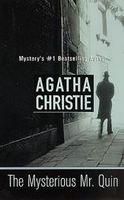The Mysterious Mr. Quin, by Agatha Christie
>> Friday, August 25, 2006
 Agatha Christie's The Mysterious Mr. Quin is a collection of 12 stories which were published in magazines during the 1920s, and were only collected in a single volume in 1930. I remembered this collection fondly from my early teens, when I was devouring all of Christie's oeuvre.
Agatha Christie's The Mysterious Mr. Quin is a collection of 12 stories which were published in magazines during the 1920s, and were only collected in a single volume in 1930. I remembered this collection fondly from my early teens, when I was devouring all of Christie's oeuvre.
All twelve of these stories feature two characters. Mr. Satterthwaite, who is our... well, not narrator, because this isn't told in 1st person POV, but maybe our witness to Mr. Quin's actions? Mr. Satterthwaite is in his late sixties, an elf-like little man who knows everybody worth knowing and is known by everyone. He's spent his whole life, and most especially his latest years, as an observer, watching as other people live their high dramas, but never participating himself.
Until, that is, the events narrated in the first story, The Coming of Mr. Quin. It's New Year's Eve and Mr. Satterthwaite is staying at some friends' house, as a member of a larger party. After dinner, the men are talking about the mysterious suicide of the house's former owner, which happened in the presence of a couple of them, when someone knocks on the door. It's a gentleman named Mr. Quin, a passing motorist whose car broke down nearby and who asks for refuge for half an hour, while his chauffer fixes the car.
And during that half hour, Mr. Quin skilfully manipulates the conversation so that the whys and hows of that mysterious death become quite clear to Mr. Satterthwaite, with unexpected consequences to some of the party.
The other 11 stories vary in setting, but there's always one constant. Mr. Quin mysteriously appears when there has been or will be a need for him, acting as a catalyst for Mr. Satterthwaite to wade in and take a part in the dramas developing in front of him, always helped by Mr. Quin in seeing things in a different way.
Each story also has a link (sometimes subtle, sometimes very obvious) to the Harlequinade. I especially remember that on my first read, those mentions intrigued me enough to go to the library and investigate (no internet back then!).
The stories vary in quality, but other than the last one, which was just as confusing and nonsensical this time around as I remembered it being when I first read it, they're all interesting, neat little mysteries. And there's the bonus of the glimpse into English society in the 1920s, which was fascinating.
In general, I liked the earliest stories in the book more. It would make sense if the stories are arranged in chronological order, which I'm not sure they are. I especially liked the story I mentioned above, the second one, The Shadow on the Glass, the third, At the Bells and Motley, the seventh, The Voice in the Dark and the eighth, The Face of Helen.
On the whole, I'd rate this book a B.










0 comments:
Post a Comment